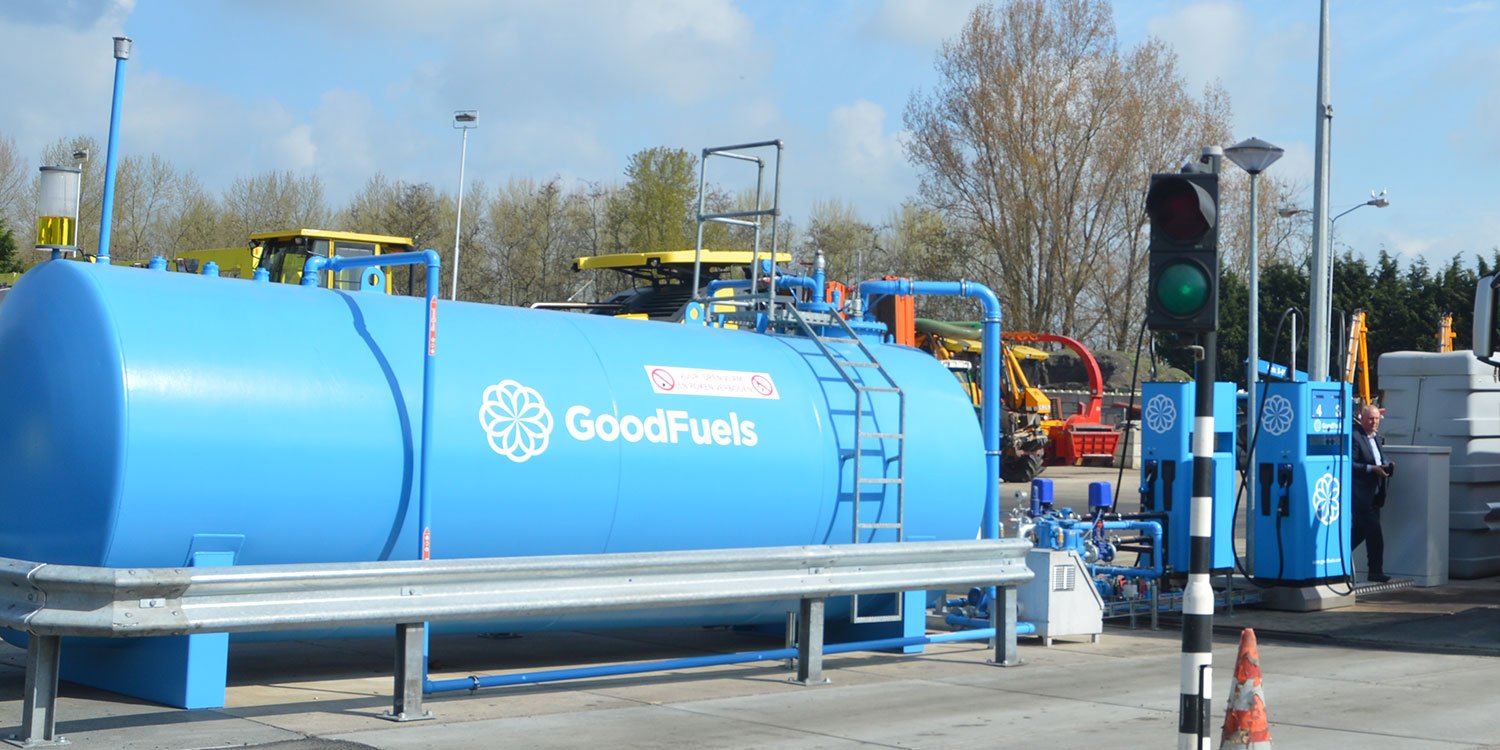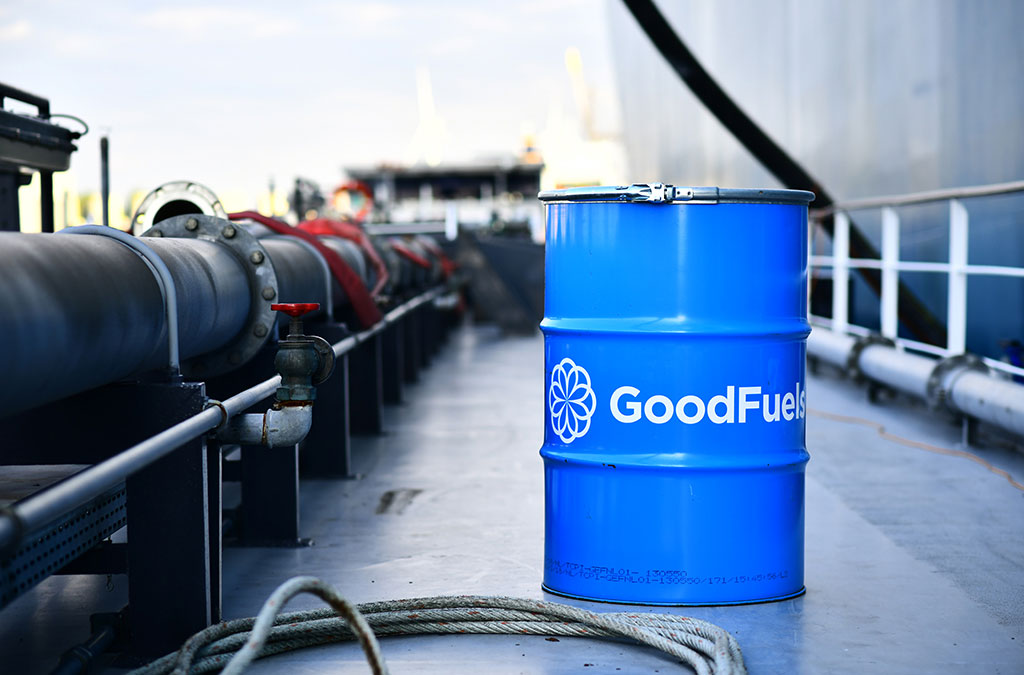

In the dynamic world of road transport, the need for sustainable fuels has never been greater. HVO diesel offers a revolutionary alternative for companies transporting goods or equipment over the road. In this detailed article, we explore the potential of HVO as the "short-term sustainability accelerator" for road transport.
1. What is HVO diesel?
HVO diesel is a biofuel used in the transport industry as a sustainable alternative to fossil fuels. HVO is therefore a sustainable alternative to fossil diesel and is seen as the only immediately available solution to reduce emissions from heavy road transport.
HVO stands for hydrotreated vegetable oil. It is an advanced biofuel that is produced using the so-called hydrotreatment method. Vegetable oils are treated with hydrogen under high pressure and a high temperature, resulting in a pure, high-quality fuel.
Now that we've covered the technical details, let's focus on what HVO means for GoodFuels: the fastest and most accessible way to reduce transport emissions, both for heavy road traffic and coastal and inland shipping. If you're involved in goods or passenger transport, HVO diesel is likely the best available option to make a significant impact on emission reduction.

HVO diesel is ideal for use in existing diesel engines. Both the emissions of this shovel and the truck that transports it are reduced by up to 80-90% when they run on HVO.
What is HVO100?
The number 100 in the name emphasizes that it is 100% HVO, so not mixed with fossil fuels. HVO100 is also sometimes called blue diesel. If you drive on HVO100, you emit 80-90% less CO2, calculated over the entire life cycle of the fuel. With a view to emission reduction, driving on HVO100 is the most effective form of driving on HVO diesel. But there are also intermediate forms available, such as HVO30, if you want to start with a lower percentage and slowly scale up the 'sustainable part' of your fuel.
How does HVO diesel contribute to reducing CO2 emissions?
HVO diesel plays a crucial role in reducing CO2 emissions by using sustainable raw materials such as vegetable oils and animal fats, which absorb CO2 during their growth phase, reducing the fuel's net emissions.

The efficient hydrotreating production process, which can be further optimized through the use of renewable energy sources, contributes to a lower CO2 footprint. The fuel provides cleaner combustion with a high cetane number, resulting in lower greenhouse gas and pollutant emissions compared to conventional diesel. This, together with studies indicating an 80-90% reduction in life cycle CO2 emissions, and the ability to use HVO100 directly in existing diesel infrastructure without modifications, makes it an effective strategy for reducing the environmental impact of transport and industry.
2. How is HVO diesel made?
One of the most important characteristics of HVO diesel is that it comes from renewable sources, such as vegetable oils. These oils can be extracted from crops such as rapeseed, soy, palm and other plant sources. The use of vegetable oils as raw material for HVO diesel contributes to reducing dependence on fossil fuels and thus contributes to a more sustainable future.
3. Is HVO diesel sustainable?
To answer this question properly, we must look at the entire life cycle of the fuel. HVO diesel is mainly produced from vegetable oils and fats and is a biofuel with a lower carbon footprint compared to traditional fossil fuels. But although HVO is derived from renewable raw materials, this fact alone does not make it a sustainable fuel in our view. The most important distinguishing factor is whether the raw material used has been grown specifically for this purpose or whether the raw material comes from waste or residual flows. This is also what we see as the difference between regular biofuel and sustainable biofuel.
Purpose-grown feedstocks
Raw materials that are purposefully grown to make biofuel run the risk of competing with another application, such as human or animal food. Land use change is also a well-known adverse effect of specially grown commodities.

Raw materials from waste and residual flows
Where purposefully grown raw materials require the cultivation of certain crops and the provision of land and labor for this purpose, waste-based HVO uses waste streams from other industries, which would otherwise be incinerated as waste. The use of these flows is a more circular and therefore more sustainable approach. It is therefore generally seen as more sustainable to only use waste and residual flows as raw materials for biofuel.
How sustainable is GoodFuels HVO?
The entire portfolio of GoodFuels products meets strict sustainability criteria. Naturally, this is also the case for GoodFuels HVO. All HVO that GoodFuels offers is 100% waste-based and is produced using raw materials from various waste and residual sources, such as used cooking oil, animal fats or other by-products from food and agricultural processes.
More information about sustainability in the (bio)fuel chain can be found under our sustainability promises.
-1.png?width=2240&height=1260&name=Untitled%20design%20(1)-1.png)
4. How does HVO diesel help make road transport more sustainable?
1. HVO diesel reduces emissions
HVO diesel not only has lower CO2 emissions over its entire life cycle, HVO also produces significantly less soot (particulate matter) and nitrogen oxides (NOx) compared to fossil diesel. This ensures better air quality, better for public health and the environment.
2. Compatible with existing diesel engines
HVO diesel is specially designed to be chemically compatible with existing diesel engines. This means that driving on HVO fits seamlessly into your existing operations and processes, whether you are a transporter, road worker, gardener or farmer. In other words, this ease of use ensures that you and your company can switch to HVO diesel without having to purchase new technology or make adjustments to your current infrastructure or vehicles. So a smooth transition!

3. Stimulate technological progress
Speaking of technology: continued research into new raw materials and developments in production techniques for sustainable biofuels, such as biofuel made from algae, bode well for efficiency and effectiveness improvements of sustainable biofuels such as HVO diesel. 'Bio-based research' is a globally active movement, led by the world's best universities, research institutes, aided by startups and NGOs, all driving the energy transition forward. With GoodFuels we have contributed to many long-term innovation projects and are still involved in a number of them to this day. It's great to see examples of this global collaboration, with the aim of solving one of our society's biggest challenges: the transition to a 'Net Zero' Economy.
4. Energy security
If you work with a new type of fuel, as an organization you want to be relatively certain that you can continue to do this in the near future. Both from an operational point of view, because any obstacle in an operational process can have major consequences for the way your company functions, and from a financial point of view, because your finance department must have a clear picture of upcoming costs at all times. And, last but not least, from an emissions reduction point of view, since control over your CO2 footprint as a company is important for, for example, CO2 reporting and the sustainability promises you make to customers.

Because HVO diesel can be produced domestically from locally available sources, it can increase energy security by reducing dependence on imported fossil fuels. This makes countries, and the companies operating in them, that need fuel less vulnerable to supply disruptions and price fluctuations in the global oil market.
5. Thoroughly tested
Since 2015, GoodFuels has been active in decarbonising the road transport sector by working with leading customers from a wide variety of industries. From public transit agencies to local governments, infrastructure contractors and OEMs, we've been building biofuel use cases for almost a decade. And we're not the only ones! From an exciting new technology at the turn of this century to a widely used alternative to fossil fuels, HVO has since been adopted and embraced by the transportation industry as the fastest and easiest decarbonization available. And also the most sustainable, provided you choose HVO fuel made from waste and residual flows such as GoodFuels HVO.
6. Emission reduction in the closed cycle
Although CO2 is released when combusting biofuels such as HVO, the organic materials used as raw materials absorb that CO2 during their growth. Although this principle is the same for fossil fuels, the big difference is that the CO2 in biofuels was already in the atmosphere - instead of somewhere in the ground. This is called a closed CO2 cycle, which means that no additional CO2 is released into the atmosphere when driving on biofuels. And the exact reason why the net emissions of biofuels are lower compared to fossil fuels.

5. How to smoothly switch to HVO diesel:
1. Check the availability
The availability of HVO diesel may vary depending on market developments and regional supply. GoodFuels HVO is available throughout the Netherlands, through our partner network of GoodFuels distributors.
2. Map the costs
It is also important to investigate at what costs HVO diesel is available to prevent unexpected increases in operating costs.
3. Make long-term agreements
In addition, it may be useful to make agreements with suppliers for a stable and long-term supply.
4. Familiarize yourself with the rules and subsidies
Furthermore, it is smart to study regulations and any subsidy or incentive programs offered by the government for the use of renewable fuels. This can help reduce costs and ease the transition.
5. Train your team
We also recommend training your team and informing them frequently about the use and benefits of HVO diesel, so that everyone within your company is involved and motivated to contribute to this sustainable change.
6. Tell your customers and partners
There is a good chance that your customers will be very happy with your switch to HVO diesel. This is because, after all, they also benefit from it, and for many companies sustainability is an increasingly important selection criterion for their suppliers. Your partners may also be curious about it, because they may be making the same kinds of steps. If you want to go fast, go alone. If you want to go far, go together!

Conclusion
HVO diesel offers a promising perspective for making (heavy) road transport more sustainable. With its ability to reduce CO2 emissions, compatibility with existing engines and positive impact on air quality, HVO is an attractive choice for companies seeking to adopt more sustainable practices. Due to the increasing availability and support from governments, HVO diesel is becoming an increasingly attractive option for the future of road transport.
Would you like to know more about HVO diesel and how it can help your company reduce your footprint? Contact us today and discover the benefits of HVO for your transport activities. Together we build a better world, and a cleaner and more sustainable future for road transport.
4 Reasons to switch to GoodFuels HVO now
1. Immediately applicable
No adjustments are required to your vehicles or fuel facilities.
GoodFuels HVO20 can be used for any engine for which the EN590 approval applies. Higher blends of GoodFuels HVO20 meet the EN15940 approval that has now been adopted by many engine builders.
2. Up to 90% CO2 reduction
GoodFuels HVO achieves up to 90% CO2 reduction, calculated over the fuel's lifecycle (Well-to-Wheel). In addition, it provides a substantial reduction of Nitrogen Oxides (NOx), Sulphur Oxides (SOx) and particulate matter (PM).
3. Technically strong properties
Because GoodFuels HVO is not hygroscopic, it does not attract water and is less sensitive to bacterial growth.
Therefore, the product is automatically suitable for long-term storage. Furthermore, GoodFuels HVO is winter-resistant (remains effective at temperatures as low as -20 degrees Celsius) and is odorless.
4. Increase your competitive position
With GoodFuels HVO you have a major impact on your scope 1 and 3 emissions as a company. For example, you can certify yourself for Lean and Green, or score better in BigMile.
Start today
Accelerate your CO2 reduction ambitions by choosing HVO diesel today.
Do you want to reduce CO2 emissions more than your company can achieve itself, do you want to make international kilometers more sustainable or the transport that you outsource? We can help with that too.
Contact us today and together we will create a tailor-made plan that fits seamlessly with the situation and reduction ambitions of your company.

In other news
In other news






